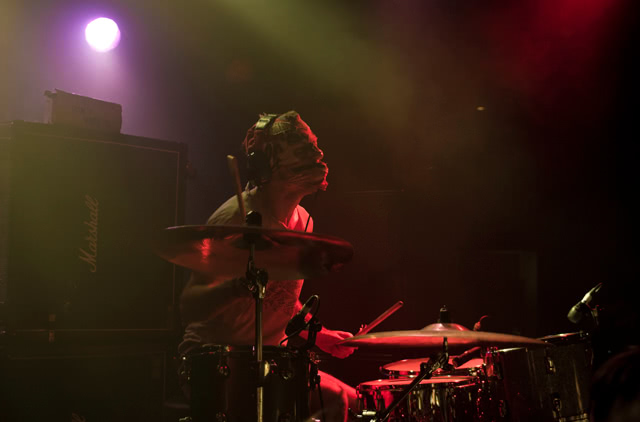Noise rock is a well-established genre in this day and age, proved by Melbourne’s own Cocks Arquette.
Playing a combination of distorted post-rock with sludge metal elements, the five-piece managed to churn out a deafeningly unique setlist. However, it wasn’t until guest saxophonist Lloyd Honeybrook started to work his magic that a crowd really started to form. Adding to the group’s fuzzy sound without ever becoming distracting, David A Karis, in conjunction with the ever-present bass, took center stage, the latter of which reinforcing the group’s thick wall of sound.
Vocalist and frontman Simon J Karis spent a lot of time with his back facing the audience, fiddling with his electronic sampling and distortion. On occasion he would spin back around to sing into the microphone, though these moments were few and far between. Definitely one of the loudest sets for one to have witnessed.
New War followed, a band that carefully manage to avoid being weighed down by genre. The most noticeable thing about the Melbourne four-piece was the absence of a guitarist, comprising solely of a drummer, bassist, keyboardist, and vocalist. They played a brand of spacey pop tunes, but to describe their sound like that is a bit of an injustice, as New War are a truly hard band to define. Each member contributed their share without taking precedence over one another, allowing the listener to focus on single members or digest the group as a whole. There was an echoing sense of camaraderie between each band mate.
Bassist Melissa Lock kept the band on track with her soft, repetitive strumming, and Jesse Shepherd added atmosphere to the group’s sound with his moody synth work. Their set really opened some eyes during the slower mid-section of one of their songs, when Steve Masterson on Drums wielded a bell-shaker while Chris Pugmire extended his microphone to him, amplifying the sound. With their distinct brand of atmospheric, ethereal rock, New War is a band to watch out for, and one that needs to be witnessed live.
Long before Lightning Bolt took the stage, an enormous swarm of fans pre-empted their set and erupted with applause when the curtains were drawn. Lightning Bolt emerged as a two-piece, hailing all the way from Providence. The unconventional setup acted as a niche for the Rhode Island duo – however, things really got underway when Brian Chippendale donned his tattered old wrestling mask and modified it with a built-in contact microphone, utilising reverb and vocoder.
After a brief chat with the audience on the subject of Man v. Food, Chippendale proposed the idea of a “quick jam” and proceeded to savagely work his kit as Brian Gibson shredded his bass guitar to a razor sharp tuning. In a word, Lightning Bolt’s sound can only be accurately described as schizophrenic. Both Chippendale and Gibson played at a dangerously accelerated speed in bizarre time signatures, which left half the audience banging their heads and the other half physically unable to, due to them being propped up by their agape jaws.
Love Music?
Get your daily dose of metal, rock, indie, pop, and everything else in between.
Partly exhausting and partly completely hypnotising, Lightning Bolt’s one hour set was an eye-opening experience. When it comes down to it, they’re really a band that plays deconstructions of other genres, hitting a wide variety of influences as opposed to just taking inspiration from other artists. It’s really a nice change of pace to witness a band perform without much of a restrictive structure and less of a backbone than most normal bands. It’s only after observing such a feat that one has to wonder – surely, night after night, they can’t get it right every time, can they?
It’s truly a remarkable skill to have, especially when playing with others, and even if they do supposedly hit the mark night after night – well, that’s all the more impressive.

































